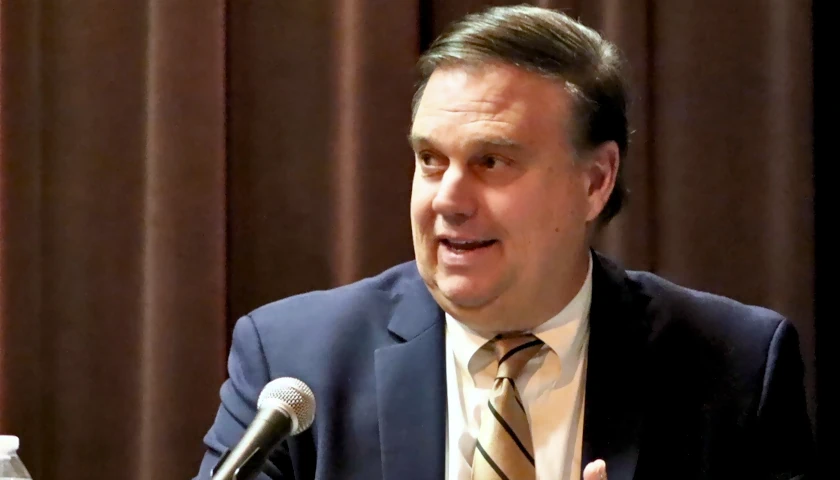The Arizona Supreme Court declined to award significant sanctions against Kari Lake’s attorneys for contesting the election results of the gubernatorial race. Instead, on Thursday the court ordered $2,000 in sanctions against her attorneys for asserting it was an “undisputed fact” that 35,563 ballots were inserted into the ballot counting process at Runbeck Election Systems. The court declined to award attorneys fees to her opponents.
The Arizona Supreme Court said in its opinion that Lake “repeatedly” asserted in pleadings that 35,563 ballots were “added” or “injected” at Runbeck. “Not only is that allegation strongly disputed by the other parties, this Court concluded and expressly stated that the assertion was unsupported by the record, and nothing in Lake’s Motion for Leave to file a motion for reconsideration provides reason to revisit that issue.”
The court added, “Although Lake may have permissibly argued that an inference could be made that some ballots were added, there is no evidence that 35,563 ballots were and, more to the point here, this was certainly disputed by the Respondents. The representation that this was an ‘undisputed fact’ is therefore unequivocally false.”
The justices said, “Because Lake’s attorney has made false factual statements to the Court, we conclude that the extraordinary remedy of a sanction under ARCAP 25 is appropriate.”
Lake’s argument about the allegedly inserted ballots focused on the discrepancy between “the number of early ballots recorded on the Runbeck Receipt of Delivery forms dated November 8-9, 2022, [which] totaled 263,379 ballots,” versus “298,942 Election Day early ballots recorded on the Runbeck Scan Receipts.” Whistleblowers testified on Lake’s behalf that there were failures at both Runbeck and Maricopa County Elections tracking the chain of custody of the ballots. Failing to track the chain of custody of ballots is a class 2 misdemeanor under Arizona law.
Lake argued in a reply on March 16 that gubernatorial winner Katie Hobbs’ own response acknowledged the discrepancy. “In her reply brief below, Lake showed that the number of ballots Runbeck received on Election Day and recorded on the MC Inbound — Receipt of Delivery forms cited by Hobbs, including all EDDB ballots received from MCTEC, totaled 263,379 ballots. Id. In her answering brief below, Hobbs also included a defense trial exhibit, MC Incoming Scan Receipt forms, which showed that Runbeck scanned a total of 298,942 ballots on Election Day — an unaccounted for discrepancy of 35,563 ballots. Id.”
The court could have awarded $700,000 in sanctions against Lake, the total of what her opponents requested. In contrast, in other election lawsuits involving voter disenfranchisement of Republicans, judges have often awarded significant sanctions against attorneys. The 10th Circuit Court of Appeals upheld nearly $187,000 in sanctions against two lawyers who challenged the 2020 presidential election. Several former Trump lawyers are still in the process of appealing $175,000 in sanctions against them for a similar challenge in Michigan.
Judges across the country have frequently ordered new elections where there were small election anomalies. In 2019, a judge ordered a new election for a Georgia House seat based on merely finding that four voters were ineligible. In 2021, in Surry County, North Carolina, a judge ordered a new election in the commissioners’ race over the mere action of a poll worker informing voters that one of the candidates was deceased. However, in none of these types of situations has there been extensive voter disenfranchisement of just Republicans.
Lake lost to Hobbs by about 17,000 votes, less than one percentage point. In March, the Arizona Supreme Court reversed the trial court’s dismissal of the issue of signature verification, remanding it back to that court for further proceedings. The court also said it would begin discussing whether to grant sanctions against Lake’s attorneys requested by her opponents. In its Thursday order, the court reminded the trial court to proceed with the signature verification issue.
– – –
Rachel Alexander is a reporter at The Arizona Sun Times and The Star News Network. Follow Rachel on Twitter. Email tips to [email protected].
Photo “Kari Lake” by The Kari Lake. Background Photo “Arizona Supreme Court” by davidpinter. CC BY 3.0.





